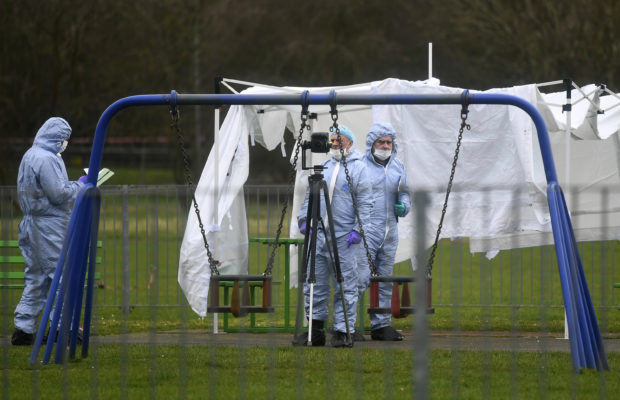
Police forensic officers at the scene in east London Saturday March 2, 2019, following the fatal stabbing of a 17-year-old girl on Friday night. Two 17-year-olds were stabbed to death last weekend in different parts of England, plunging families into grief and igniting an intense debate published in Britain’s news media Tuesday March 5, 2019, about why so many young people are dying, and who is to blame.(Victoria Jones/PA via AP)
LONDON — Jodie Chesney was a keen Explorer Scout. Yousef Makki wanted to be a surgeon.
The two 17-year-olds were stabbed to death on the same weekend in different parts of England, plunging friends and families into grief and igniting an intense political debate about why so many young people in Britain are being killed — and who is to blame.
“How many more?” asked the Daily Mail on Tuesday alongside photos of 27 teenagers who have been stabbed to death in the past year. The Daily Mirror pointed the finger at Prime Minister Theresa May: “How many more, Mrs. May?”
After falling for a decade, knife crime is on the rise in Britain. There were 285 knife homicides in England and Wales from April 1, 2017 to March 31, 2018, the highest number since comparable records began in 1946.
The number of people admitted to hospitals with blade injuries rose 8 percent from the year before.
Knives are the most common weapon used in slayings in the U.K., where guns are tightly restricted. About 40 percent of murder victims were stabbed to death last year, while only 4 percent were shot.
Both the causes of the crime wave and its solutions are hotly disputed. Police leaders and opposition politicians blame years of public spending cuts by the Conservative-led government, which has slashed funding to police by almost 20 percent since 2010, leading to 20,000 fewer officers on the streets.
Government cuts to local budgets also mean there are fewer youth programs and after-school activities and worse mental health services for young people in many areas.
“Of course there’s a link between youth centers having massive cuts, mental health services having massive cuts, schools having massive cuts, children’s services having massive cuts and young people having less constructive things to do,” said London Mayor Sadiq Khan, a member of the opposition Labour Party.
“The government needs to wake up, reverse these cuts to our police — but also our preventative services too,” he told Sky News.
The government denies austerity is to blame. May insisted Monday there was “no direct correlation between certain crimes and police numbers.”
She was contradicted by Britain’s most senior police officer, who said “of course there is” a link between crime levels and police numbers.
“In the last few years police officer numbers have gone down a lot, there’s been a lot of other cuts in public services, there has been more demand for policing and therefore there must be something,” Metropolitan Police chief Cressida Dick told radio station LBC.
Experts say rising crime can’t be blamed solely on government cuts. Police and community workers say the surge in violence is partly driven by battles over control of the illegal drug trade. Social media plays a role in escalating disputes from online threats into real-life violence.
In London, authorities recently set up a Violence Reduction Unit, which treats violence as a public health issue, rather than simply as a law-and-order problem. It brings together police, health workers, probation staff and community groups, seeking to identify potential perpetrators and victims and tried to steer them away from crime.
London’s approach is modeled on a program introduced in the early 2000s in Glasgow, Scotland, which managed to reduce murders in the city by almost half.
It’s a long-term approach whose results may not be clear for years. Meanwhile, the families of the latest victims await justice.
A 17-year-old boy was charged Tuesday with murdering Makki, who was stabbed in the street Saturday in a wealthy commuter village on the edge of Manchester. Another 17-year-old was charged with assisting the alleged killer. Neither can be named for legal reasons because of their ages.
Police also arrested a man Tuesday over the killing of Chesney, who was stabbed in the back Friday evening as she sat on a park bench with friends in an eastern suburb of London. He has not been charged.
Some in Britain are calling for longer sentences for knife crimes, which have already been toughened in recent years. Merely carrying a bladed weapon can bring a four-year prison sentence.
“My argument is build more prisons — we need to have a consequence,” said John Apter, national chairman of police officers’ union the Police Federation of England and Wales.
But Tim Bateman, an expert in youth justice at the University of Bedfordshire, said a “getting tough” approach would likely be counterproductive.
“Young people in particular tend not to think through the consequences of their actions, so responses that that rely on deterrence simply don’t work,” he said. /jpv